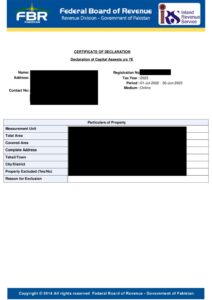Table of Contents
Introduction:
Section 81—Resident and non-resident persons.— (1) A person shall be a resident
person for a tax year if the person is —
(a) a resident individual, resident company or resident association
of persons for the year; or
(b) the Federal Government.
- Briefly introduce the concept of tax payer residential status in Pakistan.
- Explain why understanding residential status is important for taxpayers.

Types of Residential Status–(S-81)
- Resident Individual: [S-82]
- Non-Resident Individual: [S-83]
- Resident Company: [S-84]
a) Resident Individual [S-82]
i. Not based on Nationality, based on Physical Presence in Pakistan
Residency is not tied to nationality; instead, it’s determined by the number of days an individual spends in Pakistan during a tax year.
| 0 – 182 days | 183 days or more |
| Non Resident | Resident |
Even if a government servant is posted abroad, they will be treated as a resident for tax purposes, irrespective of their physical stay in Pakistan.
iii. Citizen of Pakistan, present in one foreign country
A citizen of Pakistan who is present in one foreign country during a tax year is still considered a resident taxpayer.
| 0 – 182 days | 183 days or more |
| Non Resident | Resident |
iv. Citizen of Pakistan, who is not resident taxpayer of any other country, will be treated as resident
If a citizen of Pakistan is not a resident taxpayer of any other country, they will be treated as a resident for tax purposes in Pakistan.
v. Counting of days shall be made in accordance with Rule-14 of Income Tax Rules, 2002
The counting of days is crucial in determining residential status and is done in accordance with Rule-14 of the Income Tax Rules, 2002.
Rule-14 of Income Tax Rules, 2002:
Days Not to Be Counted:
- Day or part of the day in Pakistan solely by reason of being in transit between two different places outside Pakistan.
Days to Be Counted:
- Part of a day shall be counted as a whole day in the following cases:
- Day of arrival in Pakistan.
- Day of departure from Pakistan.
- Public holiday.
- Leave, including sick leave.
- Holiday spent in Pakistan before, during, or after activity in Pakistan.
- Day when activity was interrupted due to strike, lockout, delay in receipt of supplies.
Understanding these nuances is essential for individuals to accurately assess their residential status and fulfill their tax obligations.
Residential Status Practice
i. Mr. Shamraiz – Federal Govt Employee:
- Occupation: Director Operations in the Ministry of Tourism.
- Posting: On 15 July 2017, he was posted to the Pakistan Embassy in Italy for two years.
Given that Mr. Shamraiz is a federal government employee and was posted abroad, he is treated as a resident for tax purposes, irrespective of his physical stay in Pakistan. Therefore, Mr. Shamraiz is considered a Resident taxpayer during his posting in Italy.
ii. Mr. Akmal – UK Based Company Employee:
- Occupation: Working on a special project for his UK based company.
- Duration: Sent to Pakistan on 01 February 2018, and left on 23 August 2018 (stay less than 183 days).
Since Mr. Akmal stayed in Pakistan for less than 183 days during the tax year, he falls under the category of a Non-Resident taxpayer. In this case, he would be liable for taxes only on the income earned within Pakistan during the period of his stay, with no obligation to report or pay taxes on his foreign-source income.
In summary:
- Mr. Shamraiz is a Resident taxpayer during his posting in Italy.
- Mr. Akmal is a Non-Resident taxpayer due to his stay in Pakistan being less than 183 days.
Taxation Implications
In summary, the tax implications for residents and non-residents in Pakistan are clear-cut. A resident taxpayer, be it an individual, company, or AOP, is obligated to pay taxes on both Pakistan source and foreign source income. On the other hand, non-resident taxpayers in Pakistan are only subject to taxation on income derived from within the country, with no tax liabilities on foreign source income. This nuanced distinction highlights the importance of understanding one’s residential status for effective tax planning and compliance, ensuring a transparent and informed approach to financial responsibilities.

Frequently Asked Questions (FAQs) and Their Answers
1. Q: What factors determine my residential status for tax purposes in Pakistan?
A: Your residential status is determined by factors such as physical presence in Pakistan, government service abroad, and the count of days spent in the country. For detailed information, refer to Section 81 and Rule-14 of the Income Tax Rules, 2002.
2. Q: How does the physical presence rule impact my tax liability as a resident individual?
A: If you spend 183 days or more in Pakistan during a tax year, you are considered a resident individual and are liable to pay taxes on both Pakistan and foreign-source income. This rule is not tied to nationality but emphasizes the importance of days spent in the country.
3. Q: Can a government servant posted abroad be considered a resident for tax purposes?
A: Yes, irrespective of their physical stay in Pakistan, a government servant posted abroad is treated as a resident for tax purposes. This rule ensures that even those serving the government internationally fulfill their tax obligations.
4. Q: What is the significance of Rule-14 in determining residential status?
A: Rule-14 of the Income Tax Rules, 2002 outlines the specific cases when a day should or should not be counted towards residential status. Understanding this rule is crucial for accurate assessment, helping individuals and entities navigate their tax responsibilities.
5. Q: How does tax liability differ for resident and non-resident taxpayers in Pakistan?
A: Residents, including individuals, companies, and associations of persons, are obligated to pay taxes on both Pakistan and foreign-source income. Non-residents, however, are only taxed on income derived within Pakistan. This distinction is vital for effective tax planning and compliance.
6. Q: Can you provide examples of tax implications for resident and non-resident taxpayers?
A: Certainly! For instance, a federal government employee posted abroad (resident) has different tax implications compared to a non-resident individual working on a short-term project in Pakistan. Understanding these scenarios is crucial for informed financial decision-making.
7. Q: How can individuals ensure transparent and compliant tax planning?
A: Individuals can ensure transparent and compliant tax planning by understanding their residential status, keeping abreast of tax laws, and seeking professional advice. Regular updates on changes in regulations are essential for staying informed.

How Can I Help You?
- Return Filing Services:
- Whether you need assistance with individual or business returns, I’ve got you covered. Your returns will be prepared professionally and in accordance with Income Tax rules.
- Customized Solutions:
- Have specific requirements or unique situations? Let’s discuss your needs, and I’ll tailor my services to meet your individual circumstances.
- YouTube Description:
- Find my number in the YouTube description and drop me a message. I’ll get back to you as soon as I’m available.
- Website:
- Visit my website and give me a call or leave a message. I’ll respond promptly to address your queries.
- WhatsApp:
- Prefer WhatsApp? Feel free to send me a message, and I’ll assist you as soon as I’m available.
Professional and Rule-Compliant Services: Rest assured that the services provided will be professional and adhere to Income Tax rules. Your peace of mind is my priority, and I’m committed to offering you the best solutions.
Feel free to reach out whenever you have questions or require assistance with your income tax matters. Looking forward to helping you navigate the world of taxation seamlessly! JazakAllah!






